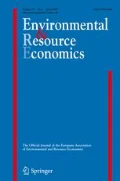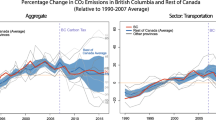Abstract
There are a number of features of climate change which make it one of the most challenging problems confronting policy makers and policy analysts. In this paper we consider three such features: (i) climate change is a global pollutant so there are strategic interactions between governments over climate policy; (ii) cutting greenhouse gas emissions can have significant cost effects across a number of sectors of the economy, raising concerns about the implications of climate change policy on competitive advantage; (iii) the long-time scales on which climate change operates means that an important dimension of climate change policy is policy towards R&D to cut the costs of dealing with climate change. In Ulph and Ulph (1996) [Ulph A, Ulph D (1996) In: Carraro C, Katsoulacos Y, Xepapadeas A (eds) Environmental policy and market structure. Kluwer, Dordrecht, pp 181–208] we presented a model to analyse these issues, but considered only environmental policies. In this paper we extend that analysis to allow for both a richer set of policy instruments (environmental and technology policies) and a richer strategic context.
Similar content being viewed by others
References
Barrett S (2006). Climate treaties and “breakthrough” technologies. Am Econ Rev Papers Proc 96(2): 22–25
Bennear LS, Stavins RN (2007) Second-best theory and the use ofmultiple policy instruments. Environ Resour Econ 37(1):111–129 (this issue)
Brander J, Spencer B (1983). International R&D rivalry and industrial strategy. Rev Econ Stud 50: 707–722
Buchner B, Carraro C (2005). Economic and environmental effectiveness of a technology-based climate protocol. Climate Policy 4: 229–248
Fankhauser S, Pearce D, Tol R (1997). The aggregation of climate change damages: a welfare-theoretic approach. Environ Resour Econ 10: 249–266
Golombek R, Hoel M (2006) Second-best climate agreements and technology policy. Adv Econ Anal Policy, 3(1), Article 1
Groom B, Hepburn C, Koundouri P, Pearce D (2005). Declining discount rates: the long and the short of it. Environ Resour Econ 32(4): 445–493
Katsoulacos Y, Ulph D (1998). Endogenous spillovers and the performance of research joint ventures. J Ind Econ 46: 333–357
Katsoulacos Y, Xepapapdeas A (1996). Environmental innovation, spillovers and optimal policy rules. In: Carraro, C, Katsoulacos, Y and Xepapadeas, A (eds) Environmental policy and market structure. Kluwer, Dordrecht
Katsoulacos Y, Ulph A, Ulph D (2001) Environmental policy and the welfare performance of research joint ventures. In: Carraro C, Metcalf G (eds) Behavioural and distributive effects of environmental policy. Chicago University Press, pp 309–346
King D (2006). The changing climate of global warming. Presentation to EnBW changing climate congress, Berlin
Kolstad C, Ulph A (2006) Learning and international environmental agreements. Paper presented to conference on learning and climate change, IIASA, Vienna
Neary JP (2006). International trade and the environment: theoretical and policy linkages. Environ Resour Econ 33: 95–118
Pearce DW (1991). The role of carbon taxes in adjusting to global warming. Econ J 101: 938–948
Pearce DW (2001). Can we resolve global environmental problems without international agreements. Paper presented to The Law and Economics of Environmental Policy, London
Pearce DW (2003). The social cost of carbon and its policy implications. Oxford Rev Econ Policy 19: 362–384
Pearce D (2005). The social cost of carbon. In: Helm, D (eds) Climate change Policy, pp 99–133. OUP, Oxford
Pearce DW, Cline WR, Achanta A, Fankhauser S, Pachauri R, Tol R, Vellinga P (1996) The social costs of climate change; greenhouse damage and the benefits of control. In: IPCC Climate change 1995: economic and social dimensions of climate change. CUP, Cambridge, pp 183–224
Porter M, Van der Linde C (1995). Towards a new conception of the environment-competitiveness relationship. J Econ Perspect 9: 97–118
Rauscher M (1997). International trade, factor movements and the environment. Clarendon Press, Oxford
Smith S, Swierzbinski J (2007) Assessing the performance of the UK Emissions Trading Scheme. Environ Resour Econ 37(1):131–158 (this issue)
Stern N (2006). The economics of climate change. HM Treasury, London
Ulph D (1994). Strategic innovation and strategic environmental policy. In: Carraro, C (eds) Trade innovation, environment. Kluwer, Dordrecht
Ulph A (1996). Environmental policy and international trade when governments and producers act strategically. J Environ Econ Manage 30: 265–281
Ulph A (1997) International trade and the environment: a survey of recent economic analysis. In: Folmer H, Tietenberg T (eds) The international yearbook of environmental and resource economics 1997/8. Edward Elgar, pp 205–242
Ulph A (2004). Stable international environmental agreements with a stock pollutant, uncertainty and learning. J Risk Uncertainty 29(1): 53–73
Ulph A, Ulph D (1994). The optimal time path of a carbon tax. Oxford Econ Papers 46: 857–868
Ulph A, Ulph D (1996). Trade, strategic innovation and strategic environmental policy – a general analysis. In: Carraro C, Katsoulacos Y, Xepapadeas A (eds) Environmental policy and market structure, pp 181–208. Kluwer, Dordrecht
Ulph A, Ulph D (1997). Global warming, irreversibility and learning. Econ J 107: 636–650
Ulph A, Ulph D (2006) Climate change, environmental policy, technology policy and commitment – a note. mimeo, University of Manchester
Author information
Authors and Affiliations
Corresponding author
Rights and permissions
About this article
Cite this article
Ulph, A., Ulph, D. Climate change—environmental and technology policies in a strategic context. Environ Resource Econ 37, 159–180 (2007). https://doi.org/10.1007/s10640-007-9123-6
Published:
Issue Date:
DOI: https://doi.org/10.1007/s10640-007-9123-6




